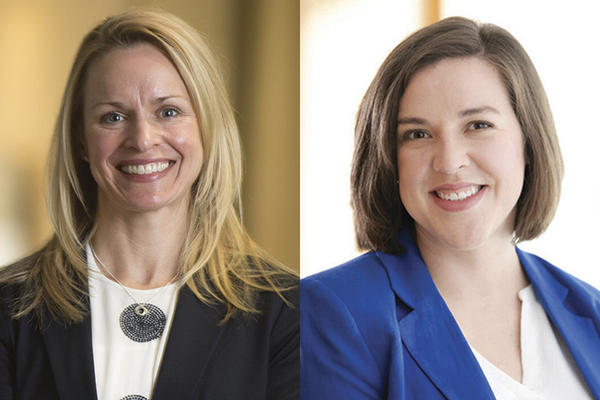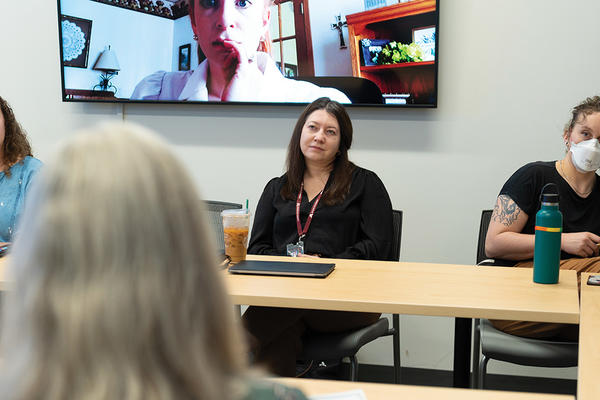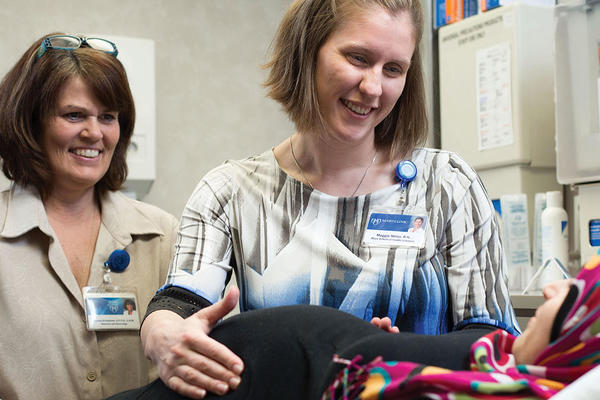Advocates for nursing
Student Policy Summit helps nursing students find their voices and shape policy
November 14, 2023
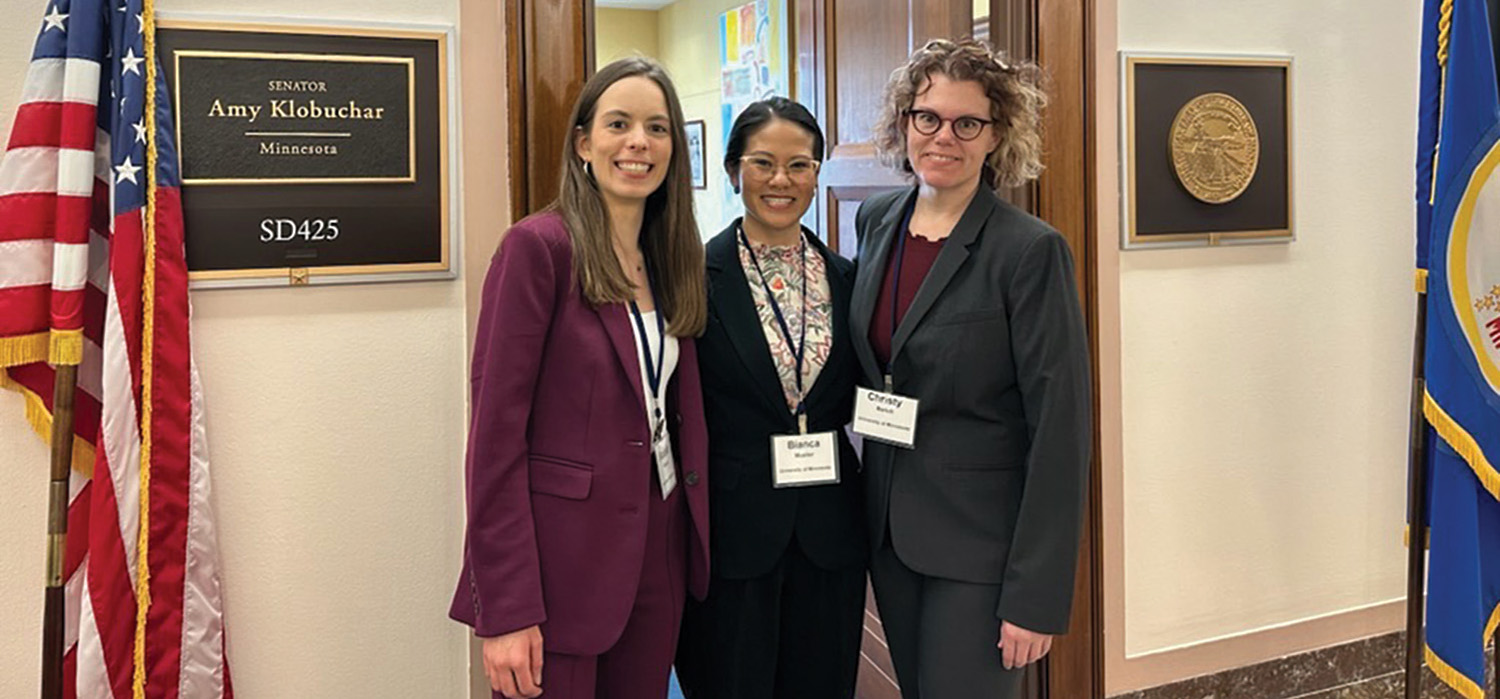
Above: Christy Barich, Elizabeth Hansel and Bianca Onrubia Mueller visited staffers from Minnesota’s congressional delegation during the AACN Student Policy Summit.
Nursing is the nation’s largest health care profession with nearly 5.2 million registered nurses, a total almost four times the size of the physician workforce.
There are 19 physicians in the 118th Congress (15 in the House, four in the Senate) and just two nurses. A nurse has never served in the Senate.
From local to state to the federal level, nurses have been historically underrepresented in elected office and their unique experiences in health care and understanding social determinants of health have all too often been left out of policy discussions and lawmaking.
Christy Barich, MEd, BSN, RN, CDCES, Elizabeth Hansel, BSN, RN, and Bianca Onrubia Mueller, BSN, RN, hope to change that. The three represented the School of Nursing at the American Association of Colleges of Nursing (AACN) Student Policy Summit in Washington, D.C. last March. During the two-day conference they were immersed in didactic program sessions focused on the federal policy process and nursing’s role in professional advocacy, and they visited staffers from Minnesota’s congressional delegation.
“For me the visit to Capitol Hill during the Student Policy Summit was really empowering,” says Hansel who graduated from the BSN program in May and is completing an ICU nurse residency program. “Health policy always intimidated me. Health care and funding is very complex, so I always felt like I didn’t know enough to advocate for policy changes. But the Student Policy Summit really made me realize that advocating for policy is not as intimidating as it sounds. I think nursing school really equips us to advocate for change. We learn from our professors and in the clinical setting how to advocate for patients, and I think a lot of those skills translate to being able to advocate for policy.”
Hansel, who fell in love with policy while serving on the city of Roseville’s Human Rights Commission while in high school, sees herself branching out more into health care policy in the future, possibly leading to a role on Capitol Hill advising legislators. She hope nursing students realize they aren’t powerless and have the potential to create real change while in school.
“We have experiences with clinicals and we learn about a lot of the issues facing the nursing profession,” she says. “I think we can use a lot of that knowledge to advocate for the nursing profession.”
Visiting D.C. was nothing new for Barich who says she was, “kind of born with a social justice bend.” Earlier in her youth she lobbied Congress on behalf of the Runaway and Homeless Youth Act. It was during this advocacy work that she learned how policy connects to all aspects of life and she wanted to continue to serve the community through advocacy after entering nursing.
“We have a unique role as nurses. There are a wide variety of things we can advocate for and that our voices are really wanted for,” says Barich, who enrolled in the health innovation and leadership (HIL) specialty in the Doctor of Nursing Practice program with the goal of being better prepared to access decision-making spaces to influence legislative and organizational policy. “I knew that I would be getting more skills that would be helpful in articulating and doing what I want to do, which is ultimately to work on eliminating health disparities and toward health equity.”
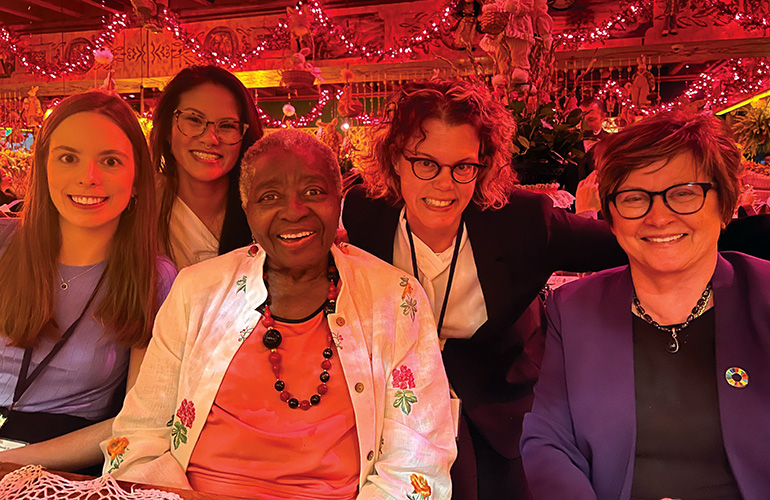
Like Hansel, Barich thinks nursing students shouldn’t feel intimated getting involved in advocacy as it’s a skill they have and use every day on behalf of patients and their families.
“We’re in this unique space as nurses where there’s a lot of potential for advocacy,” says Barich “It’s a very natural extension of what we already do. There’s a lot of entry points and you can enter at a place where you feel comfortable.”
She thinks one area where nurses could share their expertise and have a real impact is with government requests for feedback and comments on proposed rules and policy. And she adds that personal stories are particularly important for helping officials understand how policies impact the lives of their constituents.
“Policy is accessible and it should be, and we have a place there as nurses,” adds Barich.
